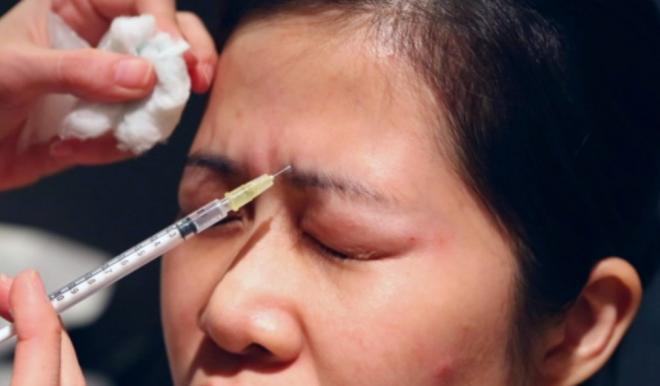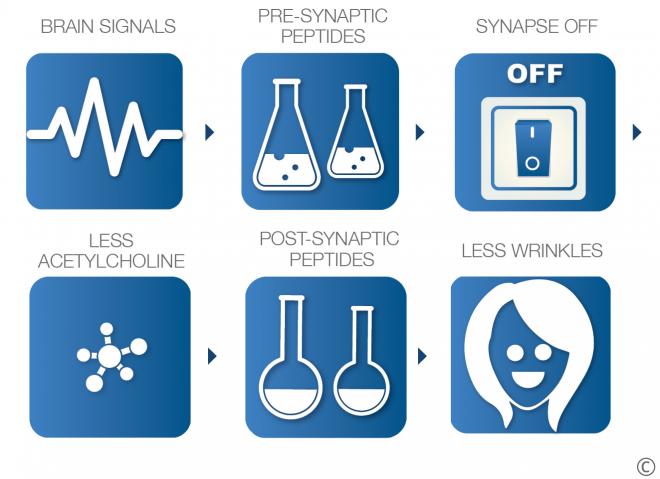Peptides in Skincare are Becoming Big Business
By Mark Miller, MD | Nov 22, 2019
In 2012, billionaire Warren Buffet made a surprising addition to the Birkshire Hathaway empire – cosmetics.
Late that summer, one of his key companies, Lubrizol – the chemical giant - purchased Lipotec, a world leader in high-tech, active ingredients dedicated to cosmetics. They are the producer of the famed neuropeptide ARGIRELINE and its vamped up successor, SNAP-8. Birkshire Hathaway (Buffet) acquired the company to enhance its cosmetic ingredient portfolio.
Peptides are big business, but not all skincare products containing them are created equal. According to Dr. Mark Miller – one of America’s top 100 plastic surgeons, “many brands don’t use enough of the ‘right’ peptides, like those made by Lipotec, because these ingredients are expensive.”
As medical director of the skincare company Dermasensa, he touts his brand’s UP ULTRA PEPTIDE SERUM as a prime example of doing it right.
“In our doctors’ vast experience, we’ve found that these ingredients work best in higher concentrations,” Dr. Miller said. “When we formulated UP serum to combat wrinkles, we paired it with 23% neuropeptides manufactured by the global leaders Lipotec, Sederma, and Pentapharm.”
Dermasensa can really claim vast experience, as it was founded by an eye-popping 20 medical doctors.
In our doctors’ vast experience, we’ve found that these ingredients work best in higher concentrations, - Dr. Mark Miller
Dermasensa can really claim vast experience, as it was founded by an eye-popping 20 medical doctors.
Skincare products with peptides are extremely popular with dermatologists and plastic surgeons because of their proven efficacy. Two decades ago, facial peptides were still in their early stages, so most patients looking to erase wrinkles turned to Botox injections. Botox worked by paralyzing the muscles of the face in order to even out wrinkles and lines.
Next, facial fillers became popular. These injections added volume to the skin in order to smooth out wrinkles. Unfortunately though, these kinds of dramatic results came with a cost: a steep price tag, inconvenient trips to the doctor, and painful injections.
Since then, science has made incredible strides in making topical anti-aging treatments that are painless, affordable, and can be done from home. Most of these breakthroughs came in the form of facial peptides.
But, what exactly ARE peptides and why are they so important to our skin?
One of the key components that make up our bodies is protein, which is composed of amino acids. Peptides are special proteins that are made up of chains of these amino acids in varying lengths. In our bodies, these chains are responsible for a wide variety of functions – from regulating our hormones, to helping our immune system, to telling our cells how to communicate with each other.
There are a lot of different kinds of peptides out there but today we’ll focus on two types that are particularly good at keeping our skin smooth and young.
Neuropeptides
The official definition of neuropeptides are: “small protein-like molecules (peptides) used by neurons to communicate with each other. They are neuronal signaling molecules that influence the activity of the brain in specific ways.”
In skincare, this cell-communicating ability is especially important, because these ingredients can actually stop and reverse the aging process of our cells. In addition, these peptides can also be used to relax facial wrinkles. The most effective ones work by inhibiting the release of acetylcholine, which controls muscle contractions.
How We Get Wrinkles
Some examples of common types of neuropeptides include Argireline - the peptide responsible for starting the facial peptide revolution - SNAP-8, LEUPHASYL, and SYN-AKE
Signal Peptides
Peptides can also work by signaling to our cells that they need to do something specific, such as stimulate collagen production.
Our skin is primarily made up of collagen, a type of protein made up of long segments of amino acids.
Collagen is incredibly important because it’s what gives our skin its smooth, firm appearance. When we’re young, we have plenty of collagen, which is why our skin looks tight and radiant.
But as we age, our skin starts to produce less and less collagen. And as it breaks down, those long segments of amino acids become shorter and shorter until they become tiny little proteins, resulting in peptides.
These small chains start to send messages to our skin telling it that it’s time to make more collagen. Science has actually gotten so good that it can actually mimic this natural bodily response, so when you apply peptides to your skin with serums and creams, it tricks your skin into thinking it needs to produce more collagen, effectively slowing down the signs of aging.
Types of signal peptides include Matrixyl – the most famous of this type -, Matrixyl-3000, and SYN-COL.
Clearly there are a lot of options when it comes to choosing a peptide skincare product– many of which can cost $150 to $300 a bottle.
According to Dr. Dean Goodless, a board certified dermatologist in Florida,
“there’s a lot hype involved with anti-aging skincare, which can be confusing for the consumer. Some brands try to dazzle you, throwing everything but the kitchen sink into their cream and serums,” said Dr. Goodless, also a co-founder of the cosmeceutical skincare company, Dermasensa.
“From my clinical perspective, I’ve found this approach can be redundant and that it’s more important to focus on a few key peptides based on their function and ability to work together. The key for wrinkles is taking a pre and post synaptic approach.”
There’s a lot hype involved with anti-aging skincare, which can be confusing for the consumer. - Dr. Dean Goodless
Dr. Goodless cited a chart from Dermasensa’s UP webpage to explain this process:
Results
Can peptides in topical creams and serums really deliver noticeable results?
In 2013, the University of Reading (UK) performed a study on the first popular peptide Matrixyl. They discovered it could almost double the amount of collagen the cells in our body produce, leading to firmer and younger-looking skin.
In addition, there are many other independent, placebo controlled studies performed by bioscience manufacturers that prove the efficacy of peptides.
Now we can see why Buffet and big business are taking notice.





